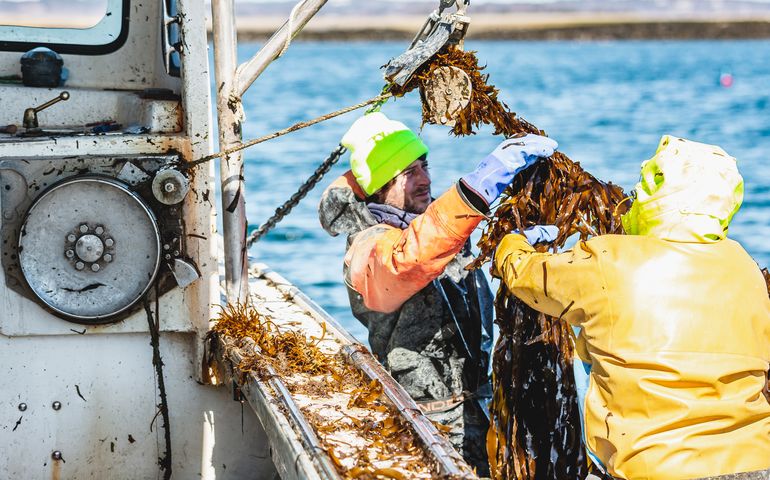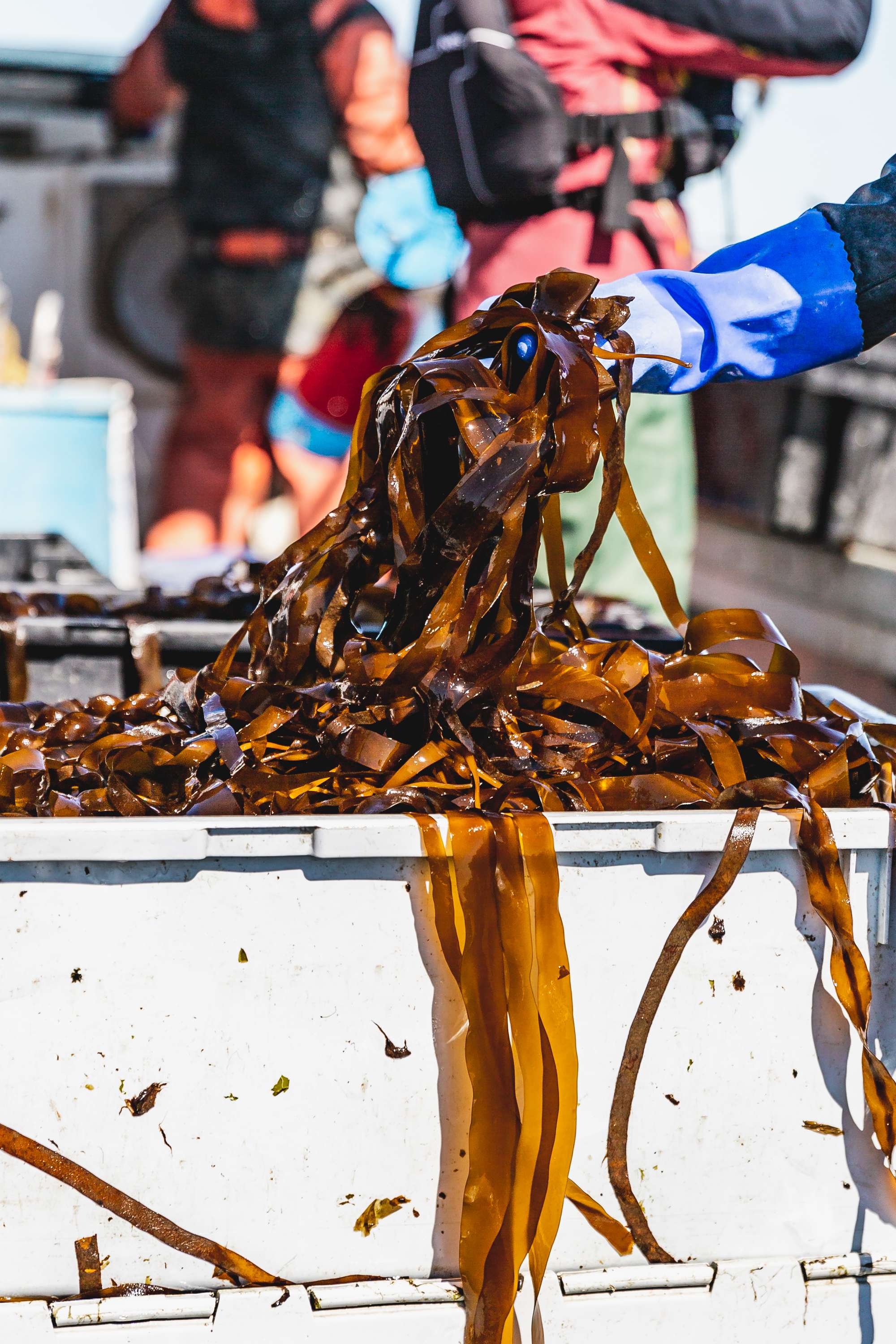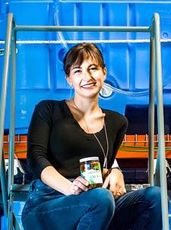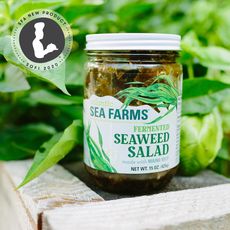
Soaring seaweed demand drives York County food processor to quadruple its space
 Courtesy / New England Ocean Cluster, Atlantic Sea Farms
Lobsterman and kelp farmer Justin Papkee and his crew harvest kelp off Long Island in Casco Bay.
Courtesy / New England Ocean Cluster, Atlantic Sea Farms
Lobsterman and kelp farmer Justin Papkee and his crew harvest kelp off Long Island in Casco Bay.
Driven by growing product demand, a York County food processor of farmed seaweed is about to move into space four times the size of its current digs.
Atlantic Sea Farms recently leased 27,800 square feet of industrial space at 20 Pomerleau St. in Biddeford from Westfield Inc. Greg Hastings and Sam LeGeyt from NAI The Dunham Group and Mike Cobb and Robert Tragemann from Colliers’ Maine office brokered the deal.
Atlantic Sea Farms, which makes a variety of food items from a common Maine seaweed, kelp, is currently in an industrial facility of about 7,000 square feet at 89 Industrial Park Road in Saco.
The impending move reflects growing demand for the company’s retail and wholesale products. Its retail line, developed in 2019, has grown nearly 10-fold, from 160 locations at that time to about 1,300 today, the company’s CEO, Briana Warner, told Mainebiz.
In its current facility, “When we process, we have to pull down one part of our processing line in order to put up the next section because we’re so tight in here,” she said. “It’s just too small. I take my phone calls right now in the entryway because it’s the only way we won’t bother people. We’re all on top of each other.”
Warner is a 2020 Mainebiz Next List honoree.
Year-long search
The new location consists of 24,000 square feet of first-floor industrial space and 3,800 square feet of offices on the second floor.

Warner said the search for new space took over a year, and evaluated places from Biddeford to Brunswick. The search area was largely driven by the location of the company’s “partner-farmers” who grow the kelp that’s processed. Most of them are in the midcoast area and the rest are in Casco Bay.
“We need to be where we can find production staff and where our distributors will pick up along the highway corridor,” she added. “We finally found a wonderful property with a landlord who’s willing to work with us,” she said. “It’s been a really nice partnership. It’s a perfect spot for us to grow.”
There’s a substantial amount of build-out before the team can move in.
“It’s basically an empty concrete warehouse,” she said.
The work will include installation of floor drains and a nursery to house the tanks that are used to grow kelp seed before it’s sent to the partner-farmers to grow into market-size product.

The architect on the job is Matthew Provencal of Mark Mueller Architects in Portland and the contractor is Benchmark Construction in Westbrook.
Additional investment will include more equipment such as coolers and freezers. The larger space is expected to allow the company to add machinery designed to make processing more efficient, which will help keep price points down, Warner said.
Warner declined to cite the investment. The equipment is financed through Gorham Savings Bank.

“We have a great relationship with Gorham Savings,” she noted. “They’ve been incredible partners for us, as we work toward equipment loans.”
Growing staff
Atlantic Sea Farms grows, processes and sells kelp and kelp products such as ready-cut kelp, kelp cubes, a fermented kimchi-like product called Sea-Chi and a vegan probiotic sauerkraut called Sea-Beet Kraut. Products are available for the food service industry and retail sales.
The company’s founders created the first commercially viable seaweed farm in the United States in 2009, according to its website.
In 2019, the company processed 240,000 pounds of kelp that were harvested by 24 partner-farmers. The complement expanded to 27 in 2020, when they harvested 450,000 pounds.
This year, the number of partner-farmers remains 27, but many have expanded their kelp-growing operations and its project they will harvest 670,000 pounds for 2021.
Warner said several more partner-farmers are due to come onboard this year.
In 2019, the company employed four full-time employees and additional employees during the production season.
Today, there are nine permanent staff and 10 seasonal production staff work at the plant. There’s also a team of sales and marketing staff.
The company launched its fermented seaweed salad in Austin, Texas-based supermarket chain Whole Foods nationwide this past April. In March, Atlantic Sea Farms' introduced its ready-cut kelp and kelp cubes throughout Phoenix-based chain Sprouts Farmers Market.

During the harvest from April through June, staff picks up kelp from farmers. The company also produces kelp seed that’s distributed free to farmers.
Warner said she’ll be recruiting more production and marketing employees at the larger facility.
In the past few months, she added a new hire with the job title of “seaweed supply and innovation manager.” Thew Suskiewicz is a marine scientist whose studies have taken him from the giant kelp forests of California into the Arctic and throughout the North Atlantic.
The goal is to move the nursery part of the operation to the new digs in the next three or four weeks, and the rest of the operation by the end of October.
Mainebiz web partners
The cultivation of sea veggies, harvesting, processing and transit limits the market and increases the costs, which is why markets import it from Japan and Korea. Kombe can be grown in rows , cut to length and will grow back. Depending on the type, processing can be tedious and slow esp. where tiny shellfish are growing on the fronds. The USDOA experimental sea veggie processing center in Franklin is somewhat dormant, while other plucky entrepreneurs are exploring other markets, like frozen salads. As the market expands, large processing facilities will be needed.










1 Comments